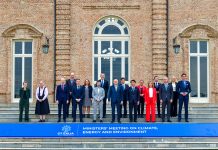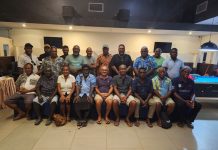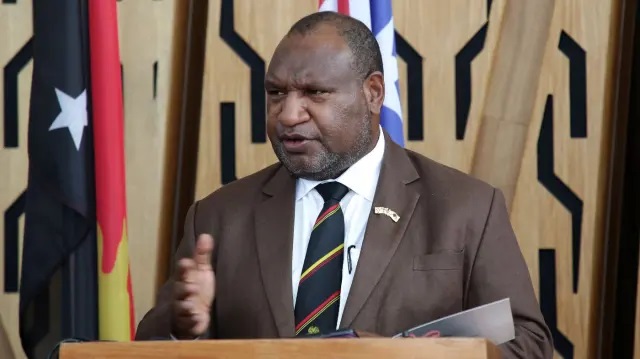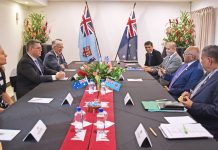Papua New Guineans have reacted with disappointment to the news that U.S president, Joe Biden, has cancelled his visit to the capital, Port Moresby, in order to focus on debt limit talks in Washington.
Preparations for the visit – the first by a sitting U.S president – began six months ago and included a plan to shut down the country’s airspace as well as to designate next Monday a public holiday to allow residents of Port Moresby to catch a glimpse of the president. Roads were set to be closed and students and cultural dancing groups were planning to line the path of Biden’s motorcade.
On Tuesday, before the news of the cancellation broke, the front page of the Post-Courier newspaper featured a full page story on Biden’s security arriving ahead of the visit.
“We are disappointed that this historic visit has been cancelled as we have prepared well, spent a lot of time, effort and energy towards the visit and we were all looking forward to the visit,” said Powes Parkop, the governor of the National Capital District.
Biden had confirmed that he would visit PNG for three hours on Monday, after attending the G7 meeting in Japan, but cancelled on Tuesday evening in order to be in Washington to meet with congressional leaders to avert a debt default.
Biden was also set to travel to Sydney to attend a meeting with the leaders of Australia, Japan and India after his visit to PNG. Australia’s prime minister confirmed on Wednesday that the Quad meeting would be postponed as well.
“We look forward to finding other ways to engage with Australia, the Quad, Papua New Guinea and the leaders of the Pacific Islands Forum in the coming year,” the White House said in a statement.
Prime minister James Marape could not be reached for comment, but opposition leader Joseph Lelang said that “many citizens who wanted to catch a glimpse of … Biden would be disappointed”.
“But we do understand that there are domestic issues back in the United States that needed his attention,” he said
Lelang added that the cancellation of the trip would give the prime minister the opportunity to outline the details of a proposed defence treaty with the U.S.
“Information on the contents of the Defense Cooperation Treaty with the United States [is] sketchy,” said Lelang.
This week Marape confirmed that two security agreements would be signed with the U.S, on defence cooperation and maritime surveillance, during Biden’s visit. Marape had said his government would provide details on the security agreements on Thursday.
Opposition groups had raised concerns that PNG would be stuck between and increasingly hostile U.S and China, if the country signed a security treaty with the U.S.
“We have a foreign policy of ‘Friends to All and Enemies to None’. We … should not be blinded by the dollar sign or be coerced into signing deals that may be detrimental to us, in the long run,” Lelang said.
Despite the cancellation of Biden’s visit, operations to provide security for the five presidents and ten prime ministers – including Indian prime minister Narendra Modi – who will be in the country to attend the Forum for the India-Pacific in Port Moresby next Monday will remain in place, according to internal security minister Peter Tsiamalili.
“The airport closure only applied for the U.S president Biden’s visit, so only that will not be applicable, but we will continue to maintain [security] operations for the Indian Prime Minister Narendra Modi and Pacific Leaders,” Tsiamalili said.
Meanwhile, Institute of National Affairs (INA) executive director, Paul Barker, said that the cancellation of the visit by Biden “may not be a bad thing for PNG.
“He will still send a senior representative, but it was always going to be a bit of a rushed visit,” Barker said.
“Preparing for a less rushed visit by the President at a later date, but still before the next U.S election period rolls out, will enable him to have a more meaningful visit with wider local engagement.”
Asia Society Policy Institute senior fellow Richard Maude said the cancellation of Biden’s visit to Papua New Guinea could set back Washington’s battle for influence with Beijing in the region.
“The mantra in the region is all about turning up. Turning up is half the battle. China turns up all the time, and so the optics aren’t great,” Maude, a former Australian intelligence chief, told a panel discussion on the Quad on Wednesday.
SOURCE: THE GUARDIAN/PACNEWS














